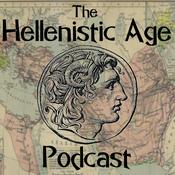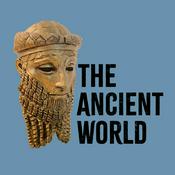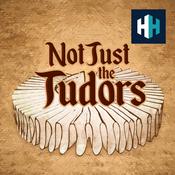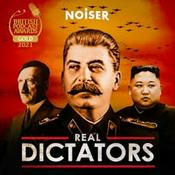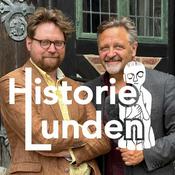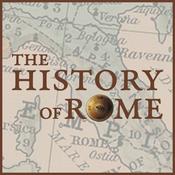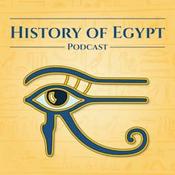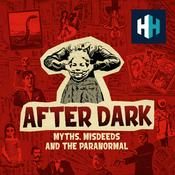222 avsnitt
- Melvyn Bragg and guests discuss the life and role of one of the most significant figures in early 20th Century German history. Paul von Hindenburg (1847-1934) had been famous since 1914 as the victorious commander at the Battle of Tannenberg against Russian invaders, soon burnishing this fame on the Western Front and Hindenburg was to claim he would have won there too, if enemies at home had not 'stabbed Germany in the back'. He won Germany’s Presidential election twice during the Weimar Republic, as a candidate of national unity and, while he gained his second term as a ‘stop Hitler’ candidate, President Hindenburg was to appoint Hitler as Chancellor and transfer some of his charisma onto him – a move so disastrous that Germans were later to ask if the myth of Hindenburg had always been an illusion.
With
Anna von der Goltz
Professor of History at Georgetown University, Washington DC
Chris Clark
Regius Professor of History at the University of Cambridge
And
Colin Storer
Associate Professor in Modern European History at the University of Warwick
Producer: Simon Tillotson
Reading list:
William J. Astore and Dennis E. Showalter, Hindenburg: Icon of German Militarism (Potomac Books, 2005)
Benjamin Carter Hett, The Death of Democracy: Hitler's Rise to Power (William Heinemann, 2018)
Andreas Dorpalen, Hindenburg and the Weimar Republic (first published 1964; Princeton University Press, 2016)
Jürgen W. Falter, 'The Two Hindenburg Elections of 1925 and 1932: A Total Reversal of Voter Coalitions' (Central European History, 32/2, 1990)
Peter Fritzsche, 'Presidential Victory and Popular Festivity in Weimar Germany: Hindenburg's 1925 Election' (Central European History, 32/2, 1990)
Larry Eugene Jones, Hitler Versus Hindenburg: The 1932 Presidential Elections and the End of the Weimar Republic (Cambridge University Press, 2016)
Martin Kitchen, The Silent Dictatorship: The Politics of the German High Command under Hindenburg and Ludendorff, 1916-1918 (first published 1976; Routledge, 2021)
John Lee, The Warlords: Hindenburg and Ludendorff (Weidenfeld & Nicolson, 2005)
Frank McDonough, The Weimar Years: Rise and Fall, 1918-1933 (Apollo, 2023)
Nadine Rossol and Benjamin Ziemann (eds.), The Oxford Handbook of the Weimar Republic (Oxford University Press, 2022)
Richard Scully, 'Hindenburg: The Cartoon Titan of the Weimar Republic, 1918-1934' (German Studies Review, 35/3, 2012)
Colin Storer, A Short History of the Weimar Republic (Revised Edition, Bloomsbury, 2024)
Anna von der Goltz, Hindenburg: Power, Myth and the Rise of the Nazis (Oxford University Press, 2009)
Alexander Watson, Ring of Steel: Germany and Austria-Hungary at War, 1914-1918 (Penguin, 2015)
J. W. Wheeler-Bennett, Hindenburg: The Wooden Titan (first published 1936; Macmillan, 1967)
In Our Time is a BBC Studios Audio Production - Melvyn Bragg and guests discuss Korea's brief but significant period as an empire as it moved from the 500-year-old dynastic Joseon monarchy towards modernity. It was in October 1897 that King Gojong declared himself Emperor, seizing his chance when the once-dominant China lost to Japan in the First Sino-Japanese War. The king wanted to have the same status as the neighbouring Russian, Chinese and Japanese Emperors, to shore up a bid for Korean independence and sovereignty when the world’s major powers either wanted to open Korea up to trade or to colonise it. The Korean Empire lasted only thirteen years, yet it was a time of great transformation for this state and the whole region with lasting consequences in the next century…
With
Nuri Kim
Associate Professor in Korean Studies at the faculty of Asian and Middle Eastern Studies at the University of Cambridge and Fellow of Wolfson College
Holly Stephens
Lecturer in Japanese and Korean Studies at the University of Edinburgh
And
Derek Kramer
Lecturer in Korean Studies at the University of Sheffield
Producer: Simon Tillotson
Reading list:
Isabella Bird Bishop, Korea and her Neighbors: A Narrative of Travel, With an Account of the Recent Vicissitudes and Present Position of the Country (first published 1898; Forgotten Books, 2019)
Vipan Chandra, Imperialism, Resistance and Reform in Late Nineteenth-Century Korea: Enlightenment and the Independence Club (University of California, Institute of East Asian Studies, 1988)
Peter Duus, The Abacus and the Sword: The Japanese Penetration of Korea, 1859-1910 (University of California Press, 1995)
Carter J. Eckert, Offspring of Empire: The Koch'ang Kims and the Colonial Origins of Korean Capitalism, 1876–1910 (University of Washington Press, 1991)
George L. Kallander, Salvation through Dissent: Tonghak Heterodoxy and Early Modern Korea (University of Hawaii Press, 2013)
Kim Dong-no, John B. Duncan and Kim Do-hyung (eds.), Reform and Modernity in the Taehan Empire (Jimoondang, 2006)
Kirk W. Larsen, Tradition, Treaties, and Trade: Qing Imperialism and Chosŏn Korea, 1850-1910 (Harvard University Asia Center, 2008)
Yumi Moon, Populist Collaborators: The Ilchinhoe and the Japanese Colonization of Korea, 1896-1910 (Cornell University Press, 2013)
Sung-Deuk Oak, The Making of Korean Christianity: Protestant Encounters with Korean Religions, 1876-1915 (Baylor University Press, 2013)
Eugene T. Park, A Family of No Prominence: The Descendants of Pak Tŏkhwa and the Birth of Modern Korea (Stanford University Press, 2020)
Michael E. Robinson, Korea’s Twentieth-Century Odyssey: A Short History (University of Hawaii Press, 2007)
Andre Schmid, Korea Between Empires, 1895-1919 (Columbia University Press, 2002)
Vladimir Tikhonov, Social Darwinism and Nationalism in Korea: The Beginnings, 1880s-1910s (Brill, 2010)
In Our Time is a BBC Studios Audio Production - Melvyn Bragg and guests discuss one of the best known events and figures in Irish history. In 1014 Brian Boru, High King of Ireland, defeated the Hiberno-Norse forces of Sigtrygg Silkbeard and allies near their Dublin stronghold, with Brian losing his life on the day of battle. Soon chroniclers in Ireland and abroad were recording and retelling the events, raising the status of Brian Boru as one who sacrificed himself for Ireland, Christ-like, a connection reinforced by the battle taking place on Good Friday. While some of the facts are contested, the Battle of Clontarf became a powerful symbol of what a united Ireland could achieve by force against invaders.
With
Seán Duffy
Professor of Medieval Irish and Insular History at Trinity College Dublin
Máire Ní Mhaonaigh
Professor of Celtic and Medieval Studies at the University of Cambridge and a Fellow of St John’s College, Cambridge
And
Alex Woolf
Professor of Medieval Studies at the University of St Andrews
Producer: Simon Tillotson
Reading list:
Howard B. Clarke, Sheila Dooley and Ruth Johnson, Dublin and the Viking World (O'Brien Press Ltd, 2018)
Howard B. Clarke and Ruth Johnson (ed.), The Vikings in Ireland and Beyond: Before and After Clontarf (Four Courts Press, 2015)
Clare Downham, ‘The Battle of Clontarf in Irish History and Legend’ (History Ireland 13, No. 5, 2005)
Seán Duffy, Brian Boru and the Battle of Clontarf (Gill & Macmillan, 2014)
Seán Duffy (ed.), Medieval Dublin XVI: Proceedings of Clontarf 1014–2014: National Conference Marking the Millennium of the Battle of Clontarf (Four Courts Press, 2017)
Colmán Etchingham, ‘North Wales, Ireland and the Isles: The Insular Viking Zone’ (Peritia 15, 2001)
Colmán Etchingham, Jón Viðar Sigurðsson, Máire Ní Mhaonaigh and Elizabeth Ashman Rowe, Norse-Gaelic Contacts in a Viking World (Brepols N.V., 2019)
David Griffiths, Vikings of the Irish Sea (The History Press, 2nd ed., 2025)
James Henthorn Todd (ed. and trans.), Cogadh Gaedhel re Gallaibh: The War of the Gaedhil with the Gaill, or, the Invasions of Ireland by the Danes and other Norsemen (first published 1867; Cambridge University Press, 2012)
Máire Ní Mhaonaigh, Brian Boru: Ireland's greatest king? (The History Press, 2006)
Máire Ní Mhaonaigh, ‘Tales of Three Gormlaiths in Medieval Irish Literature’ (Ériu 52, 2002)
Máire Ní Mhaonaigh, ‘Cogad Gáedel re Gallaib: Some Dating Consierations’ (Peritia 9, 1995)
Brendan Smith, The Cambridge History of Ireland, vol. 1, 600–1550 (Cambridge University Press, 2018), especially ‘The Scandinavian Intervention’ by Alex Woolf
In Our Time is a BBC Studios Audio Production - Melvyn Bragg and guests discuss the brothers Tiberius and Gaius Gracchus whose names are entwined with the end of Rome's Republic and the rise of the Roman Emperors. As tribunes, they brought popular reforms to the Roman Republic at the end of the 2nd century BC. Tiberius (c163-133BC) brought in land reform so every soldier could have his farm, while Gaius (c154-121BC) offered cheap grain for Romans and targeted corruption among the elites. Those elites saw the reforms as such a threat that they had the brothers killed: Tiberius in a shocking murder led by the Pontifex Maximus, the high priest, in 133BC and Gaius 12 years later with the senate's approval. This increase in political violence was to destabilise the Republic, forever tying the Gracchi to the question of why Rome’s Republic gave way to the Rome of Emperors.
With
Catherine Steel
Professor of Classics at the University of Glasgow
Federico Santangelo
Professor of Ancient History at Newcastle University
And
Kathryn Tempest
Lecturer in Roman History at the University of Leicester
Producer: Simon Tillotson
Reading list:
Appian (trans. John Carter), The Civil Wars (Penguin Classics, 2005)
Valentina Arena, Jonathan R. W. Prag and Andrew Stiles, A Companion to the Political Culture of the Roman Republic (Wiley-Blackwell, 2022), especially the chapter by Lea Beness and Tom Hillard
R. Cristofoli, A. Galimberti and F. Rohr Vio (eds.), Costruire la Memoria: Uso e abuso della storia fra tarda repubblica e primo principato (L'Erma di Bretschneider, 2017), especially ‘The 'Tyranny' of the Gracchi and the Concordia of the Optimates: An Ideological Construct.’ by Francisco Pina Polo
Suzanne Dixon, Cornelia: Mother of the Gracchi, (Routledge, 2007)
Peter Garnsey and Dominic Rathbone, ‘The Background to the Grain Law of Gaius Gracchus’ (Journal of Roman Studies 75, 1985)
O. Hekster, G. de Kleijn and D. Slootjes (eds.), Crises and the Roman Empire (Brill, 2007), especially ‘Tiberius Gracchus, Land and Manpower’ by John W. Rich
Josiah Osgood, Rome and the Making of a World State, 150 BCE-20 CE (Cambridge University Press, 2018)
Plutarch (trans. Ian Scott-Kilvert and Christopher Pelling), Rome in Crisis (Penguin Classics, 2010)
Plutarch (trans. Robin Waterfield, ed. Philip A. Stadter), Roman Lives (Oxford University Press, 2008)
Nathan Rosenstein, ‘Aristocrats and Agriculture in the Middle and Late Republic’ (Journal of Roman Studies 98, 2008)
A. N. Sherwin-White, ‘The Lex Repetundarum and the Political Ideas of Gaius Gracchus’ (Journal of Roman Studies 72, 1982)
Catherine Steel, The End of the Roman Republic, 146 to 44 BC: Conquest and Crisis (Edinburgh University Press, 2013)
David Stockton, The Gracchi (Oxford University Press, 1979)
In Our Time is a BBC Studios Audio Production - Melvyn Bragg and guests explore the history and reputation of the Persian ruler Cyrus the Great. Cyrus the Second of Persia as he was known then was born in the sixth century BCE in Persis which is now in Iran. He was the founder of the first Persian Empire, the largest empire at that point in history, spanning more than two million square miles.
His story was told by the Greek historians Herodotus and Xenophon, and in the Hebrew bible he is praised for freeing the Jewish captives in Babylon.
But the historical facts are intertwined with fiction.
Cyrus proclaimed himself ‘king of the four corners of the world’ in the famous Cyrus Cylinder, one of the most admired objects in the British Museum. It’s been called by some the first bill of human rights, but that’s a label which has been disputed by most scholars today.
With
Mateen Arghandehpour, a researcher for the Invisible East Project at Oxford University,
Lindsay Allen, Senior Lecturer in Ancient Greek and Near Eastern History at King’s College London,
And
Lynette Mitchell, Professor Emerita in Classics and Ancient History at Exeter University.
Producer: Eliane Glaser
Reading list:
Pierre Briant (trans. Peter T. Daniels), From Cyrus to Alexander: A History of the Persian Empire (Eisenbrauns, 2002)
John Curtis and Nigel Tallis (eds.), Forgotten Empire: The World of Ancient Persia (The British Museum Press, 2005)
Irving Finkel (ed.), The Cyrus Cylinder: The King of Persia’s Proclamation from Ancient Babylon (I.B.Tauris, 2013)
Lisbeth Fried, ‘Cyrus the Messiah? The Historical Background to Isaiah 45:1’ (Harvard Theological Review 95, 2002)
M. Kozuh, W.F. Henkelman, C.E. Jones and C. Woods (eds.), Extraction and Control: Studies in Honour of Matthew W. Stolper (Oriental Institute of the University of Chicago, 2014), especially the chapter ‘Cyrus the Great, exiles and foreign gods: A comparison of Assyrian and Persian policies in subject nations’ by R. J. van der Spek
Lynette Mitchell, Cyrus the Great: A Biography of Kingship (Routledge, 2023)
Michael Roaf, Cultural Atlas of Mesopotamia and the Ancient Near East (Facts On File, 1990)
Vesta Sarkosh Curtis and Sarah Stewart (eds.), Birth of the Persian Empire (I.B.Tauris, 2005), especially the chapter ‘Cyrus the Great and the kingdom of Anshan’ by D.T. Potts
Matt Waters, King of the World: The Life of Cyrus the Great (Oxford University Press, 2022)
In Our Time is a BBC Studios Audio production
Fler podcasts i Historia
Trendiga poddar i Historia
Om In Our Time: History
Historical themes, events and key individuals from Akhenaten to Xenophon.
Podcast-webbplatsLyssna på In Our Time: History, Historiskt Skvaller och många andra poddar från världens alla hörn med radio.se-appen
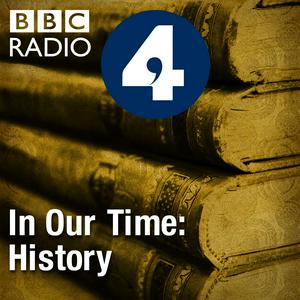
Hämta den kostnadsfria radio.se-appen
- Bokmärk stationer och podcasts
- Strömma via Wi-Fi eller Bluetooth
- Stödjer Carplay & Android Auto
- Många andra appfunktioner
Hämta den kostnadsfria radio.se-appen
- Bokmärk stationer och podcasts
- Strömma via Wi-Fi eller Bluetooth
- Stödjer Carplay & Android Auto
- Många andra appfunktioner


In Our Time: History
Skanna koden,
ladda ner appen,
börja lyssna.
ladda ner appen,
börja lyssna.



















